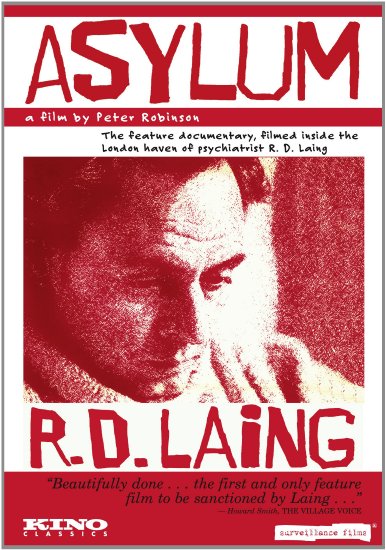Talk by Vlad Morariu on R.D. Laing’s philosophical-phenomenological influences, his clinical-political practice, and his collaboration with experimental film maker Peter Robinson. This will be followed by a screening of Asylum (1972, dir. Peter Robinson).
Ronald David Laing trained and qualified as a doctor, psychiatrist and psychoanalyst. He was a gifted musician having been elected a Licentiate of the Royal Academy of Music and an Associate of the the Royal College of Music while at secondary school. He published 15 books which sold worldwide in their millions, the most celebrated of which are: ‘The Divided Self: An Existential Study in Sanity and Madness’; ‘Sanity, Madness and the Family’, ‘The Politics of Experience and the Bird of Paradise’ and ‘Knots’. ‘The Divided Self’ is required reading on many psychology courses, now published by Penguin as a Modern Classic. To this day the life and works of R. D. Laing influence writers, poets, musicians, philosophers, psychologists, therapists, film makers and those involved with the day-to-day challenges of coping and dealing with mental distress. He was a controversial figure to the Establishment and a hero to the counter-culture movement of the 1960s, which viewed R. D. Laing as a pioneering humanitarian whose works displayed an authentic existential understanding of psychosis.
Asylum (1972, dir. Peter Robinson, 90 min.)
[via Kino Lorber]
In 1971, filmmaker Peter Robinson and a small crew entered a world of anarchic madness and healing compassion unlike any other. The resulting film, ASYLUM, records their seven week stay in radical psychiatrist R. D. Laing’s controversial Archway Community — a London row-house where the inmates literally run the asylum. Laing’s conviction that schizophrenics can only heal their shattered ‘self’ where they’re free and yet are held responsible for their actions, challenged patients, doctors and, in ASYLUM’s incredible document, the filmmakers, to live communally and peacefully.
‘I think it’s possible to get lost here,’ offers one of the uneasy medical volunteers plunged into Archway’s tribal society. Fiercely intellectual David demands attention by engaging anyone and everyone in an unending and increasingly menacing illogical discourse. Consumed by the emotional need that has claimed her sanity, beautiful, lost Julia regresses to infancy. In one astonishing scene, a patient’s father blithely explains that he has hired a girl to date his nearly catatonic son. As Archway’s residents are pushed to the point of confrontation by David’s belligerence, these and other vivid real life characters are ‘explored but not exploited by this enterprising but humanly decent film.’ (The New York Times)
A documentary treasure built from truthful moments of astonishing tension and grace, Asylum takes on a gripping narrative strength usually only seen in fiction. Hailed as ‘beautifully done’ by The Village Voice at the time of its 1972 release, Asylum has since become ‘a model of cinema verite.’ (The New York Times)
Please visit filmmaker’s website.

Biography
Vlad Morariu
Vlad Morariu (b. 1983, Iași) is a researcher, lecturer and curator. He gained his PhD in Contemporary Art History and Theory at Loughborough University, where he has been teaching since 2014. His work focuses on contemporary configurations of art practices of institutional critique, and he is interested in exploring connections between philosophy, psychiatry, art theory, and curatorial and artistic practices. Together with Jaakko Karhuunen (Loughborough University), he is currently doing research in the R.D. Laing archive hosted by Glasgow University.